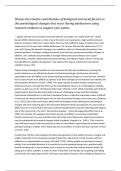Discuss the relative contributions of biological and social factors to
the psychological changes that occur during adolescence using
research evidence to support your points.
“…begins with the onset of puberty and ends with the assumption of a stable adult role” stated
Damon (2004). Adolescence is a time of your life where one experiences a big transition between
being an immature child and a mature adult. There are three different stages of adolescence: early
adolescence (10-13 years old), middle adolescence (14-16 years old) and late adolescence (17-19
years old). During this episode, teenagers turn rebellious and try to disentangle themselves from
parental guidance. Teenagers undergo hormonal, brain structure and neurotransmitter changes. In
addition, one’s attitude and personality is strongly influenced by social factors such as peer
relationships, romantic relationships and family bonding. According to Piaget’s theory, humans go
through different cognitive development , the adolescent’s stage is called formal operational
cognition (Piaget, 1950).
Puberty being a biological transition is most commonly the first sign of adolescence. During this
period, adolescence are affected by physical and hormonal changes. Social norms and social
expectations must be fulfilled as the human body goes physical changes at a very fast rate. However,
this has been known to be difficult as puberty is the time teenagers try to find their own identity and
self-perception (Peterson & Taylor, 1980). This rapid maturity transition impacts emotional and
behavioural issues, meaning that they may be psychologically upset as it is challenging to undergo
puberty as girls may not be “developmentally ready” (Rierdan & Koff, 1993). Especially, girls that hits
puberty before their friends tend to find it extremely challenging to cope with this transition.
Psychosocial relationships is at risk due to biological factors, as physical maturation makes it difficult
to preserve the same bond with peers who do not have physical changes at the same pace (Petersen
et al., 1991). One of the social factors linked with the biological factor affecting the psychological
changes with early maturing girls is the interaction between friends and opposite sex peers may be
difficult due to hormonal shifts, this leads to distressing detrimental sequelae affecting psychological
side of the human brain. The term “detrimental sequelae” means damaging aftereffect ( Ge et al.,
1996). For example, the sequelae may lead to arousal, excitability, or excessive emotionality.
Puberty may be seen as a very stressful event with a high risk of depression. Depressive symptoms
may be manipulated by hormonal changes linked to puberty ( Angold et al., 1998 ). This is also the
case with boys however with late maturity as they are more likely to get bullied due to their weaker
physique leading to a higher risk of depression due to problems at school and issues at home ( Pollack
& Shuster, 2000).
Furthermore, the five main biological transition during puberty is the sudden increase in weight and
height, maturation of the sex glands, growth of pubic hair, adjustment in body muscles and fat in
addition to an augmentation in energy, (Marshall, 1978). Gaining weight may become an issue of
obesity if not controlled therefore it is essential to use the potential energy into a positive health
benefit by taking part in new activities such as sports or any jobs that involves physical activity. By
taking part in these activities, it makes it easier to find their own identity by competing and making
new friends. This helps improve their self-esteem and build a character with confidence (Boyd & Yin,




